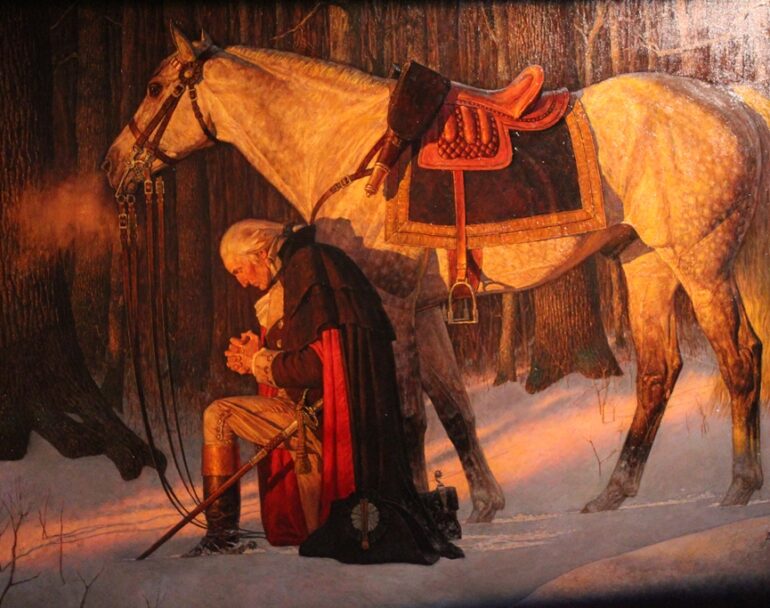
Crossing of the Delaware
General George Washington’s commitment to cross the Delaware River on Christmas 1776 foreshadowed the many hardships faced as well as the eventual victory of the Continental Army during the American Revolution.
At first glance, the decision to transport 2,400 Continental soldiers across an icy river in one night, directly into a severe winter storm of sleet and snow seems irrational. Washington’s decision, however, was based on strategic motivation, understanding that the Continental Army desperately needed a victory after months of intense fighting with several significant defeats and no major victories. Washington also understood that the element of surprise was the only way that he and his army stood a chance of defeating the highly trained Hessian mercenaries.
On the morning of December 25, 1776, Continental soldiers woke up in their camps along the Delaware River to a frozen, snowy covered ground. Weather conditions worsened and temperatures continued to drop throughout the day. Late in the afternoon, the Continentals left their tents and began to form along the river in anticipation of the night’s events. Washington kept almost all of the details of the crossing a secret; as a result, none of the soldiers knew anything about their upcoming mission.
Washington’s crossing of the Delaware River on December 25, 1776 allowed his army to strike the Hessians at Trenton the next morning.
Washington’s plan was to cross the river at night, march to the nearby town of Trenton, New Jersey, and attack the Hessian garrison right before dawn. Time was Washington’s greatest enemy; to combat it his orders called for the various regiments to assemble at their designated crossing points no later than sunset. The close proximity to the crossing points allowed the soldiers to begin the journey immediately after nightfall struck and complete the crossing no later than midnight. Once across, Washington intended for the armies to reassemble and march approximately ten miles to Trenton, arriving there no later than five o’clock in the morning to achieve surprise. Despite his meticulous planning, the schedule failed almost before it even began.
Many of the regiments did not arrive at the river until well after dark. Additionally, a severe winter storm that included wind, rain, snow, hail, and sleet met the soldiers at the banks of the river significantly slowing their crossing. Many of the boats had to combat ice jams and unfavorable currents. To make matters even worse, the extreme darkness caused by the storm made it hard for the boatmen to see the opposite shore.
The necessity of using larger ferries to carry pieces of artillery across the river caused even more delays. Washington crossed the river with John Glover’s Marblehead mariners and upon arrival debated whether or not to cancel the entire operation because it was more than three hours behind schedule.
Washington decided it was too costly to retreat and he painfully watched as his army continued to trickle across the river. The freezing and tired Continental Army assembled on the Jersey shore without any major debacles. The next morning they attacked to the south, taking the Hessian garrison by surprise and over-running the town. After fierce fighting, and the loss of their commander, the Hessians surrendered.
Washington’s victory was complete but his situation precarious. The violent weather continued – making a strike towards Princeton problematic. Washington and his commanding officers decided to retrace their steps across the Delaware taking their Hessian prisoners with them.
The news of the American victory spread rapidly through the colonies reinvigorating the failing spirit of the Revolution. The battle’s outcome also gave Washington and his officers the confidence to mount another campaign. On December 30 they again crossed the Delaware, attacked and won another victory at Trenton on January 2, and then pushed on to Princeton defeating the British there on January 3.
Although not apparent at the time, these battles were a decisive turning point in the Revolution. The victories pulled the languishing Revolution out of the depths of despair, galvanized colonial support, shocked the British and convinced potential allies such as France, Holland and Spain, that the Continental Army was a force to be reckoned with.
When, in the Providence of God, America emerged victorious in its war against the greatest military power in the world, Washington ordered a thanksgiving service to be held the day after the surrender:
“The Commander-in-chief earnestly recommends that the troops not on duty should universally attend with that seriousness of deportment and gratitude of heart which the recognition of such reiterated and astonishing interposition of Providence demands of us.”
Two years after the surrender of Cornwallis at Yorktown, the peace treaty with the British was signed. Washington and his senior officers gathered at Fraunce’s Tavern in Lower Manhattan for a farewell luncheon. At this solemn occasion, Washington said, “With a heart full of gratitude, I now take leave of you. I most devoutly wish that your latter days be as prosperous and happy as your former ones have been glorious and honorable. I cannot come to each of you but shall feel obliged if each of you will come and take me by the hand.”
Shortly thereafter, Washington issued the formal resignation of his commission before Congress. On that occasion, Washington said:
“I consider it an indispensable duty to close this last solemn act of my official life by commending the interests of our dearest country to the protection of Almighty God, and of those who have superintended of them to his holy keeping. Having now finished the work assigned me, I retired from the great theatre of action and bidding affectionate farewell to this august body under whose orders I have so long acted, I here offer my commission and take my leave of all the employments of public life.”
Christmas 1776 the first time we see the finger of God directing the course of events providing the American army and the new nation with a much needed victory.
Merry Christmas !
Jim, John, Rick and Roxanna